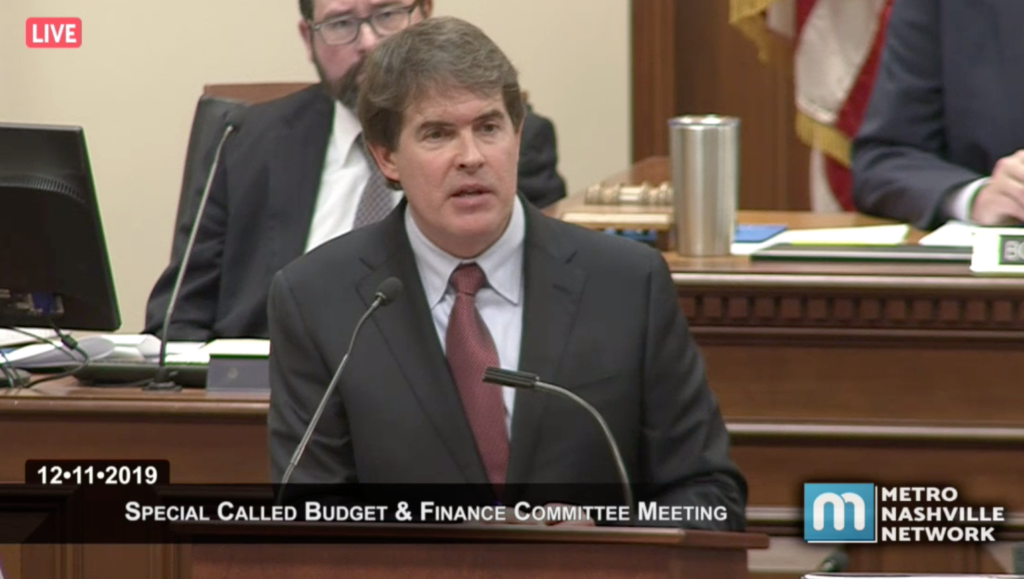
The city of Nashville has found a way to balance its budget, averting the remote possibility of a takeover by state finance officials. Yet even as the “good news” was relayed Wednesday to the Metro Council, the city’s finance director warned of even bigger financial “mountains” to climb.
“It is delusional to those who say that we are not going to have a lively debate about where that money is going to come from: property taxes, sales taxes, fees,” said finance director Kevin Crumbo.
He wouldn’t say whether the administration was considering tax increases — the subject of budget fights the past two years — but told the council that merely cutting spending won’t be enough for future balanced budgets.
Crumbo says Metro’s dire financial situation has been causing sleepless nights since he was appointed in early October.
He’s been scrambling to respond to demands from the state comptroller. A meeting last month detailed the city’s $41 million shortfall in the current fiscal year, as well as dwindling amounts of cash on hand to pay its bills next summer.
Crumbo announced to the council that he sent a short-term corrective action strategy to the state earlier in the day, and that it had been approved — albeit with a warning from Comptroller Justin Wilson.
“The proposed actions are no cure for Metro’s long-term budget concerns but are responsive to immediate financial issues,” Wilson wrote to the city. “Tough decisions will need to be made.”
- Metro’s corrective action plan (PDF)
- Comptroller’s approval letter (PDF)
- View the meeting (YouTube)
The approved plan still means significant work to come. The city must create a highly technical cash management plan — which no other Tennessee city even has, Crumbo said. Metro has also agreed to provide other financial documents and the coming year’s budget on accelerated timelines.
And the finance director and the comptroller both placed the biggest burden on the elected Metro Council, which will likely wrestle with tax rates for the third straight year.
The Details
The emergency plan includes special contributions from the Convention Center Authority ($12.6 million) and Metro Water Services ($10 million).
Smaller amounts of new money would come from refinancing of loans and reimbursements from the Convention and Visitors Corporation and a Davidson County Sheriff’s Office program.
On the cuts side, city departments are being asked to squeeze out a collective $2.6 million in savings, and Metro has impounded — or delayed — $5 million in highly popular affordable housing grants.
The finance department says it chose these options to prioritize essential city services, to avoid layoffs, to honor contracts with vendors and to “foster a culture of revenue generation and cost control” across Metro departments.

This table shows the sources Metro intends to use to fill a shortfall of $41.5 million.
“We need to press hard on our revenues. We need to press hard on targeted savings plans that were in place,” Crumbo said.
More:View a Twitter thread with additional meeting details.
Members of the Metro Council have pushed back hardest on the decision to delay grants to the Barnes Affordable Housing Trust Fund. Crumbo agreed that that decision was the most difficult, but he noted that the rules of impoundment require Metro to restore those grants if the city finds itself in a better financial situation than expected, such as a situation in which tax revenues come in higher than projected.
But the impact on housing was hardly the council’s only critique on Wednesday.
Council Misgivings
Crumbo characterized the comptroller’s quick approval as a major relief. Yet the timing spurred questions, especially since council members said they felt left out of it.
At issue was the decision by the mayoral administration to file its plan to the comptroller — and receive approval — in advance of the council meeting. The meeting had been on the calendar for weeks, and Metro was not up against a state deadline to file its plan.
“It does still lack transparency,” said Councilwoman Delishia Porterfield. “I don’t understand why the letter couldn’t have been submitted tomorrow. … It might have looked a little different once you heard how the council feels about affordable housing.”
Crumbo said he moved quickly because of his “absolute alarm” about the city’s finances. The Metro Charter does give the mayor and finance director wide latitude during mid-year financial emergencies.
Others took aim at Mayor John Cooper’s false assertion, at a large meeting of business leaders the day before, that the city government was in “receivership” with the state.
Councilman Freddie O’Connell called it “plainly untrue,” and said that inflammatory language about a municipal bankruptcy — which is not the case in Metro — could worsen a situation by scaring off residents and businesses.
Earlier in the meeting, Cooper called his language a “mistake” and laughed it off with a football joke. Crumbo noted he’d received calls from some vendors asking about Metro finances, but was explicit that Metro hasn’t been and won’t be moved into receivership.

